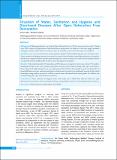Please use this identifier to cite or link to this item:
https://hdl.handle.net/20.500.14356/1554Full metadata record
| DC Field | Value | Language |
|---|---|---|
| dc.contributor.author | Kafle, Simrin | - |
| dc.contributor.author | Pradhan, Bandana | - |
| dc.date.accessioned | 2023-05-16T05:50:15Z | - |
| dc.date.available | 2023-05-16T05:50:15Z | - |
| dc.date.issued | 2018 | - |
| dc.identifier.citation | KafleS., & PradhanB. (2018). Situation of Water, Sanitation and Hygiene and Diarrhoeal Diseases After Open Defecation Free Declaration. Journal of Nepal Health Research Council, 16(2), 160-164. https://doi.org/10.33314/jnhrc.v16i2.1045 | en_US |
| dc.identifier.issn | Print ISSN: 1727-5482; Online ISSN: 1999-6217 | - |
| dc.identifier.uri | http://103.69.126.140:8080/handle/20.500.14356/1554 | - |
| dc.description | Original Article | en_US |
| dc.description.abstract | Abstract Background: Makwanpur district was declared Open Defecation Free in 2013 as the movement started in Nepal since 2003 to address the high burden of diarrhoeal disease among under five children. As the water supply, sanitation and hygiene situation of the district is not known after the declaration, the need for this study was visualized. Methods: It was a cross sectional study among randomly sampled 178 households using interview and observation. Water, sanitation and hygiene situation was assessed in terms of related facilities, knowledge and practices of mothers. Results were compared with the standard open defecation free criteria of Nepal. Five years trend of diarrhoeal disease was analysed from the health facility records to assess the impact of declaration. Results: Of the total households 92% had toilets and 90% had access to improved water source. About 79% mothers had high knowledge on safe water, sanitation and hygiene and 43% practiced hand washing with soap at critical times. Proper disposal of solid and liquid waste was found among 32% and 46% of households respectively. About 68% of households had good water, sanitation and hygiene situation and was found to be significantly associated with related knowledge among mothers irrespective of their economic status. Diarrhoeal disease among under five children was found declining after open defecation free declaration. Conclusions: Water, sanitation and hygiene status in the study area is found lower than the criteria for open defecation free declaration. However, diarrhoeal disease among children under five is declining after the declaration. Keywords: Diarrhoeal disease; Makwanpur; ODF; WASH. | en_US |
| dc.language.iso | en | en_US |
| dc.publisher | Nepal Health Research Council | en_US |
| dc.relation.ispartofseries | Apr-June, 2018;1045 | - |
| dc.subject | Diarrhoeal Diarrhoeal | en_US |
| dc.subject | Makwanpur | en_US |
| dc.subject | ODF | en_US |
| dc.subject | WASH | en_US |
| dc.title | Situation of Water, Sanitation and Hygiene and Diarrhoeal Diseases After Open Defecation Free Declaration | en_US |
| dc.type | Journal Article | en_US |
| local.journal.category | Original Article | - |
| Appears in Collections: | Vol. 16 No. 2 Issue 39 Apr-Jun 2018 | |
Files in This Item:
| File | Description | Size | Format | |
|---|---|---|---|---|
| 1045-Manuscript-5289-1-10-20180703.pdf | Fulltext Download | 229.2 kB | Adobe PDF |  View/Open |
Items in DSpace are protected by copyright, with all rights reserved, unless otherwise indicated.
